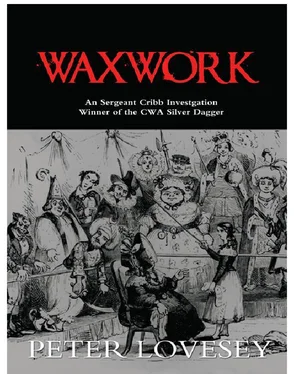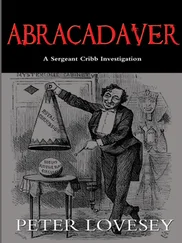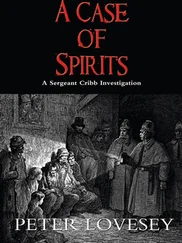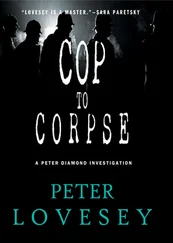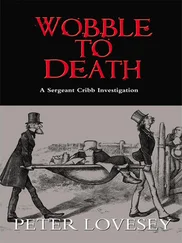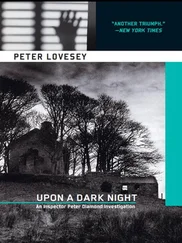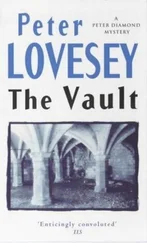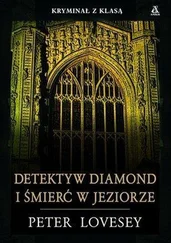Peter Lovesey - Waxwork
Здесь есть возможность читать онлайн «Peter Lovesey - Waxwork» весь текст электронной книги совершенно бесплатно (целиком полную версию без сокращений). В некоторых случаях можно слушать аудио, скачать через торрент в формате fb2 и присутствует краткое содержание. Жанр: Исторический детектив, на английском языке. Описание произведения, (предисловие) а так же отзывы посетителей доступны на портале библиотеки ЛибКат.
- Название:Waxwork
- Автор:
- Жанр:
- Год:неизвестен
- ISBN:нет данных
- Рейтинг книги:3 / 5. Голосов: 1
-
Избранное:Добавить в избранное
- Отзывы:
-
Ваша оценка:
- 60
- 1
- 2
- 3
- 4
- 5
Waxwork: краткое содержание, описание и аннотация
Предлагаем к чтению аннотацию, описание, краткое содержание или предисловие (зависит от того, что написал сам автор книги «Waxwork»). Если вы не нашли необходимую информацию о книге — напишите в комментариях, мы постараемся отыскать её.
Waxwork — читать онлайн бесплатно полную книгу (весь текст) целиком
Ниже представлен текст книги, разбитый по страницам. Система сохранения места последней прочитанной страницы, позволяет с удобством читать онлайн бесплатно книгу «Waxwork», без необходимости каждый раз заново искать на чём Вы остановились. Поставьте закладку, и сможете в любой момент перейти на страницу, на которой закончили чтение.
Интервал:
Закладка:
‘No matter, Miss Stones,’ said the governor. ‘We do not expect to take long over this.’
The cell door stood open. The governor went in first, Jowett following. Cribb waited in the doorway while the others found positions against the wall. Two wardresses and Allingham were already inside, behind Miriam Cromer, who was the only one seated, watching the influx with interested eyes.
Cribb’s first impression was that she was smaller than her portrait had suggested. But by no means was she diminished in spirit. In the graceless prison clothes, white mob-cap tied under the chin, coarse blue jacket and skirt, she succeeded still in looking elegant. She was pale from ten weeks’ imprisonment, practically as colourless as the picture in Cribb’s pocket. Her skin had the pellucid look of wax, and she was quite still, except for her eyes. They glinted with something between curiosity and challenge. They were confident, undismayed and, to Cribb, disturbing.
The governor announced who they were without putting it in so social a form as an introduction. ‘And this is Mr Allingham, the prisoner’s solicitor,’ he added for their benefit.
Allingham glanced over some papers he was studying and gave the measured nod of a legal man. Here in his black pinstripe and stiff collar he would not care to be reminded of those pictures of picnics when his hand had stolen round his client’s waist.
‘Would you begin, Chief Inspector?’ said the governor.
Jowett cleared his throat. ‘My, er, assistant, Sergeant Cribb, is to put the questions.’
‘Then he had better take the stool.’
Cribb edged between them and sat opposite Miriam Cromer. It was like entering a prize-ring. The situation was inimical to his style of questioning. He liked to find a common footing with those he interviewed, put them at their ease. Small chance of that in this grim place surrounded by officials.
He tried to hold her gaze in a way that excluded everyone else. ‘You haven’t met me before, ma’am. I took no part in the original inquiry. I was brought in to take a look at the confession you made. There are certain small matters, details really, that have come to light since your conviction. We can’t square them with your account of things. No-one says you got it wrong. The mistake may be on our side. Must be.’ He chanced a smile. ‘Well, you’re not likely to have got it wrong, seeing that you admitted to the crime.’
Her eyes focused steadily on his, conveying nothing.
‘It’s a fair assumption,’ Cribb went on, compelled to provide his own comment. Already he could see this developing into a monologue. ‘Where would be the sense in twisting facts when you know you’ll end up in this place?’ The question was rhetorical, but he paused before saying, ‘I’d like to talk about that confession, if you don’t mind.’
‘I have a copy here,’ Allingham announced. He leaned forward and put it into her hand. She took it without turning to look at him.
‘I’m obliged to you,’ said Cribb, taking out his own copy from his pocket. ‘Ma’am, I want to ask you if you stand by everything you said in this document.’
She shaped her lips to answer, but Allingham spoke first. ‘Naturally she does. This is an affidavit sworn before a magistrate. I must caution you not to impute perjury to my client, Sergeant.’
Cribb did not shift his eyes from Miriam Cromer’s. ‘May I take it that you are prepared to answer questions, ma’am?’
She nodded.
He went on, ‘I want to make it plain that I’m not here to trap you. What would be the point of that? I don’t go in for trickery.’
She surprised him by saying, ‘You leave that to the other man.’
‘The other man?’ Cribb shook his head, uncertain of her meaning.
In a level voice she explained, ‘The one who pretends he is not a policeman at all. The bearded man with a scar. He was sent to interview my husband on the pretext of having his photograph taken.’
‘Ah. I heard about this person from Mr Allingham,’ said Cribb. ‘Believe me, I know nothing about him. He is not a police officer, whoever he is.’
She twitched her lips into something like a smile. ‘I don’t expect you to admit his existence. You wouldn’t, would you? If he is not a policeman how is it that I am practically certain I saw the same man watching me from a window while I was exercising here? Is it common practice to allow members of the public into Newgate to spy on condemned prisoners, or has this place unhinged my mind?’
Whatever had been going on, it made Cribb’s task infinitely harder. He turned to the governor, who reddened and gave a quick shrug.
Allingham said, ‘Unless this is of any consequence, I suggest we confine ourselves to the affidavit, as the officer proposed.’
She set her mouth in a sullen little line. ‘As you wish.’
Cribb resumed. This would achieve nothing unless he could win her confidence. He decided to gamble. He would let her know that suspicion had shifted away from her. ‘I’ll come to the point, ma’am. Shortly after your conviction, a communication from some unknown person was received at the Home Office. It was a scrap of paper cut from a photographic journal, a picture of your husband taken in Brighton on the day Josiah Perceval was killed. An arrow had been drawn on it in red ink. The arrow was pointing to the key Mr Cromer was wearing on his watch-chain. Inquiries established that it was one of the keys to the poison cabinet. The other was found on the body of the deceased. There’s our first problem: how could you have opened the cabinet if one key was with your husband in Brighton and the other in the pocket of the man you claimed to have murdered?’ He paused.
It was put more as a statement than a question, but he was interested to see how she reacted. From the way she held her expression, eyes steady, brows tilted a fraction, he was convinced she had learned nothing new. She was studying him.
‘My superiors asked me to investigate,’ Cribb went on. ‘I studied your confession. It’s a very lucid statement, if I may say so. You say on page four’-he leafed through his copy- ‘“When Mr Perceval went out for lunch at one o’clock, I returned to the studio, unlocked the poison cabinet, found the bottle of potassium cyanide and poured about a third of the contents into the decanter of madeira. I then replaced the decanter in the chiffonier where it was kept with the others, and locked the cyanide bottle in the poison cabinet as before. Soon after, I went out …” One thing you omit to state’-Cribb looked up from the confession-‘is how you obtained the key.’
Allingham put a hand on Miriam Cromer’s arm. ‘Say nothing.’ Addressing Cribb, he said, ‘My client does not wish to add anything to the statement she has already volunteered.’
As if there had been no interruption, Cribb continued, ‘Naturally, I was obliged to check your husband’s movements on Monday, 12th March. I learned that he was not, as we had supposed, in Brighton that morning.’
Allingham cut in again. ‘I think I should point out that there is nothing in the statement suggesting what time of day Mr Cromer arrived in Brighton. Indeed, it would be impossible for Mrs Cromer to supply such information.’
Cribb persisted in addressing his remarks to Miriam Cromer. ‘When I spoke to your husband he seemed unwilling to specify which train he caught to Brighton. I learned that he had engaged to be there by half past two. The delivery of wine was at noon, was it not? On the face of it, he could have doctored the decanter himself before he left. I’ve checked Bradshaw. He could have left the house as late as 12.45 and still caught the fast to Brighton from Clapham Junction at 1.12.’
Allingham made a show of protest. ‘That’s an extraordinary suggestion, officer. If he were here-’
Читать дальшеИнтервал:
Закладка:
Похожие книги на «Waxwork»
Представляем Вашему вниманию похожие книги на «Waxwork» списком для выбора. Мы отобрали схожую по названию и смыслу литературу в надежде предоставить читателям больше вариантов отыскать новые, интересные, ещё непрочитанные произведения.
Обсуждение, отзывы о книге «Waxwork» и просто собственные мнения читателей. Оставьте ваши комментарии, напишите, что Вы думаете о произведении, его смысле или главных героях. Укажите что конкретно понравилось, а что нет, и почему Вы так считаете.
